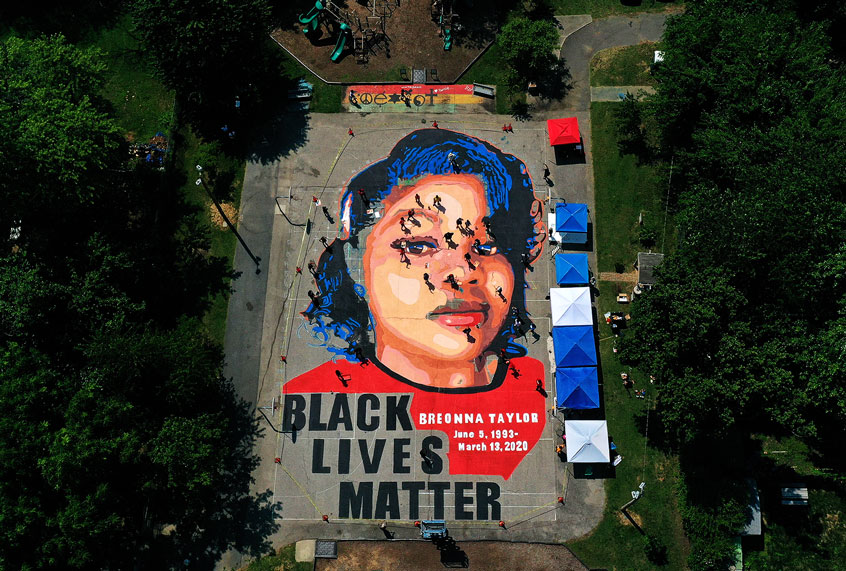The city of Louisville settled a wrongful death lawsuit with the family of Breonna Taylor for $12 million on Tuesday, Mayor Greg Fischer revealed.
The sum marks the biggest settlement the Kentucky city has ever paid out in a lawsuit over excessive police force — and one of the largest involving a Black woman killed by police in U.S. history. Fischer announced at a joint news conference with the family’s attorneys that the city would also implement a number of police reforms as part of the agreement.
The reforms will require commanders to sign off on all search warrants. Louisville will implement an “early warning system” to monitor complaints against officers, create a program to include social workers at the police department and provide housing credits to incentivize officers to live in the low-income areas they patrol. The city will also require officers to wear cameras during currency seizures and undergo random drug testing.
“My administration is not waiting to move ahead with needed reforms to prevent a tragedy like this from ever happening again,” Fischer said, adding that he was “deeply, deeply sorry” for the “tragedy” of Taylor’s death.
“For those who knew her, Breonna’s death is personal,” he added. “The pain is visceral — and the loss evermore devastating.”
Here are the police reforms from the settlement, per @louisvillemayor's office: pic.twitter.com/H1VHzKujke
— Darcy Costello (@dctello) September 15, 2020
Lonita Baker, an attorney for Taylor’s family, said the settlement was “nonnegotiable” without significant reforms.
“We do thank Mayor Fischer and his team for committing to the reform that is unheard of in these cases,” she said. “We finished the first mile in a marathon, and we’ve got a lot more miles to go to cross that finish line”
“This sets a precedent for other Black women — that they’ll be valued,” Ben Crump, another attorney for the family, said at the news conference.
Crump also reiterated his call for the officers involved in the shooting to be prosecuted — and for charges to dropped against peaceful demonstrators who protested the killing.
“Regardless of this landmark step on the journey to justice, we still are demanding that Kentucky Attorney General Daniel Cameron bring charges immediately against the officers that murdered Breonna Taylor,” he said. “We see that there are two justice systems in America: one for Black America, and one for white America. In Louisville, Kentucky, we took significant steps today in . . . trying to correct this broken criminal justice system.”
Tamika Palmer, Taylor’s mother, echoed that sentiment at the news conference.
“As significant as today is, it’s only the beginning of getting full justice for Breonna,” she said. “We must not lose focus on what the real job is. And with that being said, it’s time to move forward with the criminal charges, because she deserves that — and much more.”
Overseeing the investigation into Taylor’s shooting is Kentucky Attorney General Daniel Cameron. A grand jury, which will weigh whether or not to charge any of the three officers involved in the shooting, is expected to hear the case in the coming days.
Taylor, a 26-year-old emergency room technician, was fatally shot by police serving a no-knock warrant in search of her ex-boyfriend in March as part of a drug investigation in a different part of the city. Police claim they announced themselves.
Kenneth Walker, Taylor’s boyfriend at the time of her death, believed someone was breaking into the home. According to Walker, Officers did not announce themselves. He fired what he described as a warning shot, which struck Sgt. Jonathan Mattingly in the leg.
Mattingly and Detectives Brett Hankison and Myles Cosgrove returned fire, hitting Taylor five times. No drugs were found in the home.
Walker was charged with attempted murder of a police officer, but the charges were dismissed in May.
None of the officers have been charged. Hankison was fired earlier this year, while Mattingly and Cosgrove were placed on administrative assignment.
Taylor’s family filed a wrongful death lawsuit in April, alleging that officers used excessive force and the search warrant, which was filed under dubious circumstances, was negligent.
The family later filed an amended lawsuit alleging that Taylor’s death was the result of a city effort to clear out the block where Taylor’s ex-boyfriend lived as part of a large-scale redevelopment effort.
The city categorically denied that the police action was part of a gentrification plan, but police experts told Salon that links between police brutality and gentrification were not “uncommon.”
“If this were the case in Louisville, it would hardly be unique,” University of Colorado professor Brenden Beck, who studies the link between policing and gentrification, told Salon in May. “Cities often use police to pursue redevelopment ends and gentrification often coincides with increased policing.”

